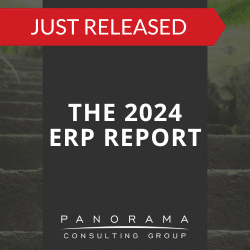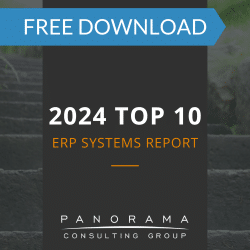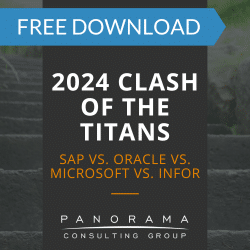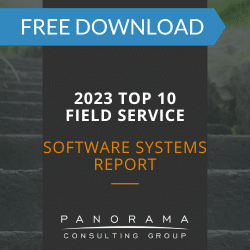In an era where technological integration is paramount for business efficiency, decision-makers often grapple with the choice between implementing an enterprise resource planning (ERP) system vs a warehouse management system (WMS).
Today, we’re breaking down the ERP vs WMS conundrum. Keep reading to learn about the functionalities and strategic benefits of each of these systems so you can select the right technology for your business goals.
The Difference Between ERP and WMS
An ERP system serves as the technological spine of a company, integrating and managing all its core functions. This includes everything from accounting and human resources to supply chain management and customer relationships.
Conversely, WMS software is specialized software designed to optimize warehouse functions. It focuses on inventory management, enhancing the accuracy of stock levels and shipments, and streamlining picking and packing processes.
Functions and Benefits: ERP vs. WMS
ERP systems enhance operational visibility and control across the organization, making them ideal for businesses that need a holistic view of their operations.
These systems enable data-driven decision-making through forecasting tools and analytics. Many of the top ERP systems are equipped with AI technology to further enable proactive decision-making.
WMS platforms, on the other hand, excel in detailed inventory control and operational efficiency within the warehouse.
These systems ensure precise monitoring and management of stock, which is vital for businesses handling sensitive or perishable goods. A WMS also supports advanced picking methodologies that minimize errors and reduce labor costs.
The 2024 ERP Report
88.5% of respondents said they deployed or plan to deploy AI at their organization. Learn about AI adoption and other ERP trends by downloading our latest report.
What are Your Business Needs?
The choice between ERP and WMS should be guided by the specific needs and characteristics of your business. These might include:
The Need for Integrated Business Functions
ERP systems are beneficial for organizations that require integration across multiple departments.
For example, a manufacturing firm might need to synchronize its production processes with inventory management and financial systems to enhance efficiency and improve decision-making. Implementing one of the top manufacturing ERP systems could help the company accomplish this.
The Need for Comprehensive Financial Integration
ERP systems integrate complex financial management processes across multiple business units and geographical locations. This integration supports everything from streamlined billing and payroll to intricate financial reporting and tax compliance.
Many businesses need a level of financial oversight and control that is beyond the scope of a WMS. This is often true of businesses that operate in multiple tax jurisdictions or that need to consolidate financial reporting from various subsidiaries.
Complex Regulatory Needs
Businesses operating in industries with stringent compliance requirements might gravitate toward ERP systems due to their robust compliance management tools.
For instance, a pharmaceutical company might need to adhere to strict global regulations, while also managing batch tracking and quality assurance. An ERP solution could help the company enhance transparency and maintain continuous compliance with industry standards, such as FDA and EMA regulations.
Specialized Warehouse Operations
Logistics and distribution centers that focus heavily on storage and transportation of goods can benefit from WMS due to its specialized inventory management features. These include capabilities such as real-time inventory updates, automated storage and retrieval systems, and efficient material handling.
Many businesses need these features for rapid order fulfillment and enhanced storage optimization.
Complex Inventory Types
Companies that handle diverse inventory types, like perishables or high-value items, find WMS systems valuable for managing these complexities effectively.
For instance, a food distributor might need to track expiration dates and maintain specific storage conditions, and thus implement a WMS to ensure quality control and reduce waste.
What About WMS and ERP Integration?
For businesses where extensive warehouse management and broad organizational integration are both necessary, combining ERP and WMS could be the ideal strategy. This integration ensures that information flows seamlessly from the warehouse to all other parts of the organization.
Our ERP consultants often help companies integrate a new WMS with an existing ERP system. When successfully implemented, the WMS tracks inventory from production to sale, while the ERP system streamlines financial reporting, resource planning, and the entire supply chain.
While ERP systems often have built-in WMS functionality, many businesses integrate a standalone WMS with their ERP. This provides companies with more in-depth warehouse management functionality, while giving them flexibility to customize warehouse operations without impacting other business processes.
If you’re considering this integration, we recommend ensuring data consistency across both platforms by developing a detailed plan for preparing and cleansing data. System compatibility is another critical factor; the underlying technology of both systems must be compatible to facilitate the flow of information.
Other common challenges we see include adequate training all end-users and securing buy-in from all levels of the organization. Anticipating these challenges before beginning software selection is the key to keeping your project on-time and on-budget.
WMS vs. ERP: The Bottom Line
Selecting enterprise software requires a detailed understanding of your business’s current and future needs. This is true regardless of the type of software systems you’re evaluating.
Contact our ERP implementation consultants to learn how to develop a digital strategy to guide your selection of enterprise software.














